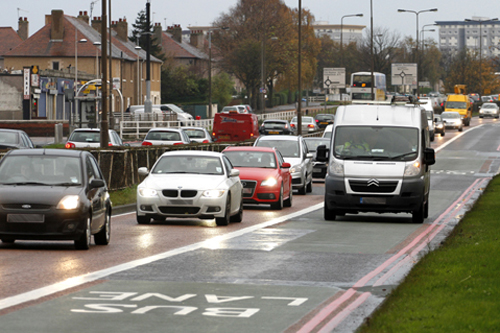ELECTRIC cars bought by “green” Scots councils are covering as little as 1,600 miles a year.
Despite price tags in the region of £25,000 per vehicle, the majority of electric cars are being drastically under-used by staff.
Figures provided under Freedom of Information reveal numerous cases of electric vehicles covering well under 4,000 miles a year.
The RAC estimate the average annual mileage of a company car at 18,600.

Taxpayers’ groups have accused councils of spending public cash on an environmentally-friendly “PR exercise” without making sure the cars actually get used.
Experts are saying council staff may be reluctant to use the electric cars bought for them because they fear running out of power and being stranded in the middle of journeys.
In 2012 Clackmannanshire bought four Renault Kangoo ZE Vans at a total cost of £96,625 to taxpayers.
Since then, one of the vehicles has travelled an average of just 2,367 miles. Even their most-used electric car ran up average mileage of just 5,421.
A spokeswoman even admitted that cost of owning and operating the four vehicles came out at £2.74 per mile per vehicle – well above the RAC’s estimated average of 55p per mile.
Falkirk Council also revealed they had purchased four electric cars, costing up to £26,145 each in 2012.
One of these vehicles, a Citroen C-Zero which cost £22,712, had an average yearly mileage of just 1,590.
South Ayrshire Council have also spent £87,423 on four electric vehicles in recent years, with one travelling just 2,341 miles per year since coming into use in July 2012.
Scotland’s three largest cities also radically underperformed.
Glasgow City Council have spent £282,700 on 11 cars which have cost £1,500 a year each in upkeep whilst travelling just 4,000 miles a year.
And after spending £70,000 on three vehicles, one of Edinburgh Council’s cars travelled an average of just 7,538 a year.
Meanwhile one of the vehicles in Dundee’s £411,00 fleet of 40 vehicles travelled just 1,752 miles in the last year – the only date range made available by the council.
Jonathan Isaby, Chief Executive of the Taxpayers’ Alliance, also weighed in, adding: “If councils are going to blow thousands of pounds buying electric cars, the least they can do is actually use the things.
“Too often electric cars were bought simply as PR exercises. Going green is a worthy goal but that’s no excuse for throwing money away on electric cars that are barely used.”
Scottish Conservative transport spokesman Alex Johnstone said: “It’s clear councils were being put under pressure to get on board with this inefficient and expensive fad.
“That’s not a good use of local authority resources – however much it will have pleased the green lobby.
“Public bodies need to remember that when using taxpayer’s money they have a duty to do so in a way that achieves best value, not simply on the fashionable item of that time.”
A spokesman from the AA emphasised that they recommended that electric videos were used as “a second family car.”
He added: “As long as it’s done sensibly rather than as green politics or to get more tax out of people then you can’t fault it.”
Meanwhile an RAC spokesman suggested that council workers may be suffering from “range anxiety”, where they fear running low on charge over long journeys.
He said the workers may be avoiding the vehicles, thinking: “Can I go on one charge and where do I get the next charge from?”
Clackmannanshire Council defended their use of electric cars.
A spokeswoman said: “Over the two and a half years we’ve had these vans they have cost £2.74 per mile travelled.”
She explained that they expected to have the vans on the road for ten years, and therefore in their view would provide “good value for money.”

